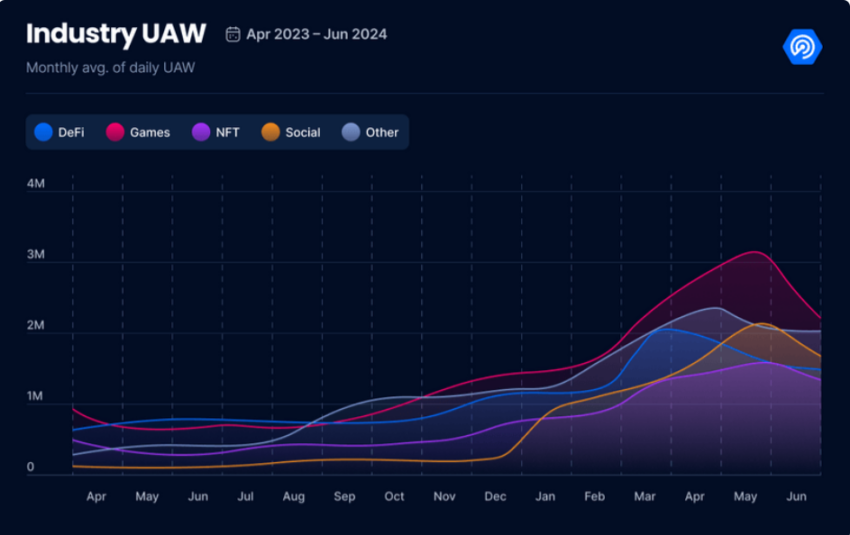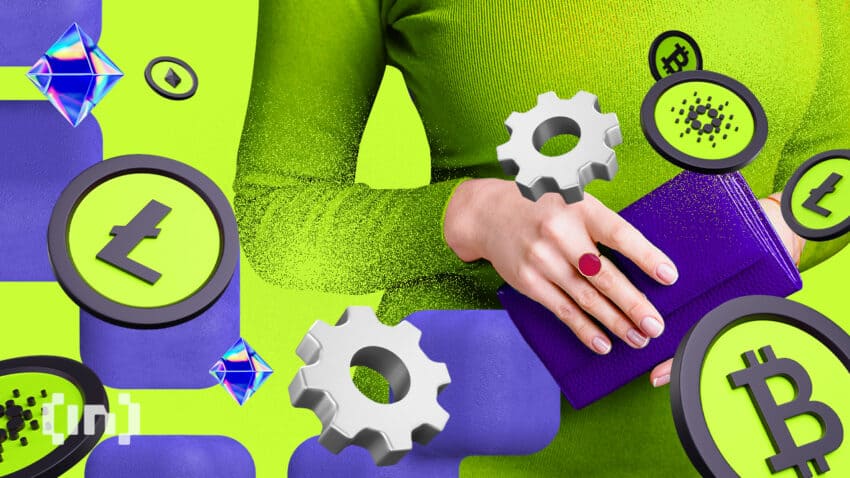Enhanced Web3 Wallets Are the Driving Force Behind Crypto Mass Adoption, Experts Say
Web3 wallets are becoming increasingly important instruments for widespread adoption in the crypto scene.
Experts like Luis Ocegueda, Head of Engineering at Trust Wallet, and Alvin Kan, COO of Bitget Wallet, highlight that Web3 wallets are adapting to meet user expectations.
Breaking Barriers: How Enhanced Web3 Wallets Simplify Crypto Use
Crypto adoption and the Web3 ecosystem have experienced a notable surge. DappRadar reports a record high in Web3 application users in Q2. Daily unique active wallets (dUAW) hit 10 million, marking a 40% increase from Q1 and the highest number to date.
Read more: 16 Best Web3 Wallets In 2024
 Unique Active Wallet in Q2 2024. Source: DappRadar
Unique Active Wallet in Q2 2024. Source: DappRadar Despite this growth, the complexity of blockchain technology remains a significant barrier for newcomers. An April report from Preply revealed that 35% of crypto investors did not feel confident in their crypto knowledge, and even 3 in 5 respondents did not know what blockchain is.
This is particularly due to the unfamiliarity with the new and complex technology. New users often struggle with some functionality, such as cross-chain transfers, seed phrases, gas fees, and decentralized applications (dApps). Alvin Kan acknowledged this challenge in a recent interview with BeInCrypto.
“You do require some kind of education in swapping or transferring tokens between chains. Why is this USDT on Ethereum different from USDT on Polygon? And stuffs like that. So, I do think multiple chains does increase the complexity,” he explained.
However, both Kan and Luis Ocegueda believe that enhanced Web3 wallets could mitigate these challenges. Smart wallets, for instance, play a crucial role in facilitating a smoother onboarding experience, making the crypto ecosystem more appealing to both new and experienced users.
“This is where smart wallets come into play, serving as essential tools to facilitate a smoother onboarding experience and making the crypto ecosystem more appealing to newbies and natives alike,” Ocegueda told BeInCrypto.
Smart wallet is a non-custodial crypto wallet powered by a smart contract on the blockchain. It enhances usability and security features, improving user experiences. For example, smart wallets streamline the user experience by handling gas fees in a user-friendly manner.
The Role of Smart Wallets in Bridging Blockchain Complexities
Companies like Trust Wallet and Bitget Wallet have been at the forefront of providing enhanced Web3 wallets. With its SWIFT feature, Trust Wallet accepts gas payments in over 200 tokens, removing users’ need to hold specific tokens. Similarly, Bitget Wallet has an InstantGas feature to enable users to swap tokens without having any native tokens in advance.
Interoperability is one of the most significant challenges in on-chain transactions. Both Bitget Wallet and Trust Wallet address this with features like account abstraction and cross-chain swaps. Users can manage assets and perform transactions on various blockchains without needing multiple wallets, significantly improving convenience and accessibility.
Ocegueda explained how a smart contract wallet can be designed to work seamlessly across different blockchains and platforms. This design allows users to interact with a wider range of DeFi services and assets, providing accessibility for managing assets and performing transactions on the go. This is particularly appealing to new and younger users.
“There is also diverse progress regarding chain abstraction enabled through smart wallets. This means users can manage their assets and perform transactions on multiple chains much more easily, which appeals to experienced users seeking a seamless experience,” he added.
As Web3 evolves, so do user expectations from wallets. Kan sees users now expect sophisticated features akin to those found in centralized exchanges (CEX).
Features like swaps, earning opportunities, and questing for rewards have become integral. To meet these growing demands, Bitget Wallet incorporates various functionalities, including smart money insights and pre-market trading.
Meanwhile, Ocegueda mentions that smart wallets can be integrated into Web2 payment systems and support diverse forms of payment. For example, crypto payments could be enabled with a Visa or Mastercard, with automatic crypto withdrawal from the wallet whenever users pay with the card.
Improving UI/UX and Security Measures
User interface and experience (UI/UX) also play important roles for Web3 wallet users. Kan admitted that the current UI/UX across the Web3 sector needs significant improvement. Often, Web3 wallet interfaces require numerous clicks and substantial education to understand, which can deter new users.
“Web2 has done it very well. And that shouldn’t be an excuse for why we can’t do it in Web3. I think this has to do with certain things, like better talent coming from Web2 to Web3 to increase the products’ UIs,” Kan opined.
Read more: 9 Crypto Wallet Security Tips To Safeguard Your Assets
Nonetheless, both experts agree that security is paramount for Web3 wallet users and the broader crypto industry. Web3 wallets have witnessed enhanced security features like multi-factor authentication (MFA) and automated fraud detection.
For instance, Trust Wallet SWIFT eliminates the risk of unlimited approvals by merging the approval process into one, leveraging batch execution. As for Bitget Wallet, besides implementing strong security measures, it is adding a $300 million protection fund to safeguard users’ assets and transaction protection.






